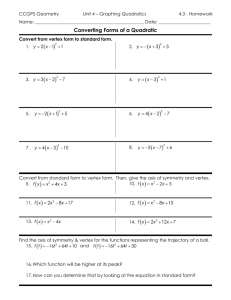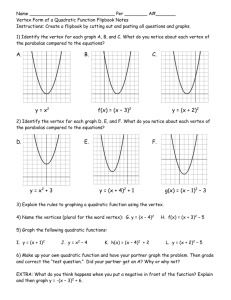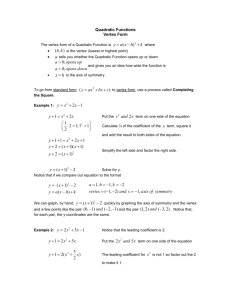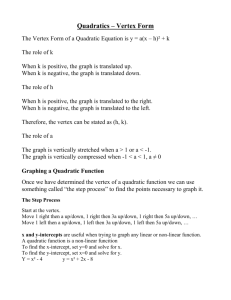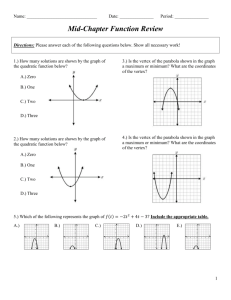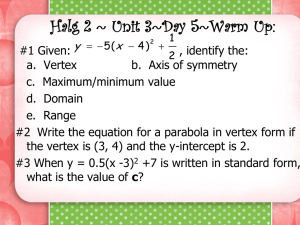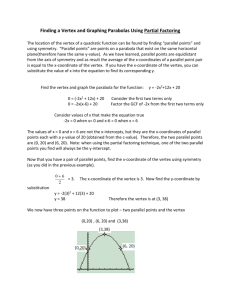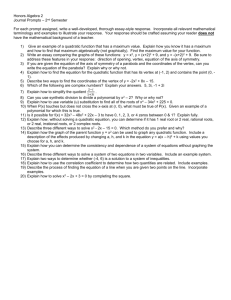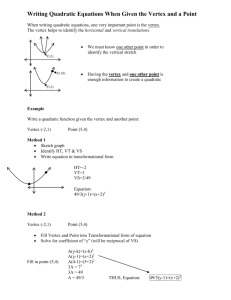chapter 9 review
advertisement
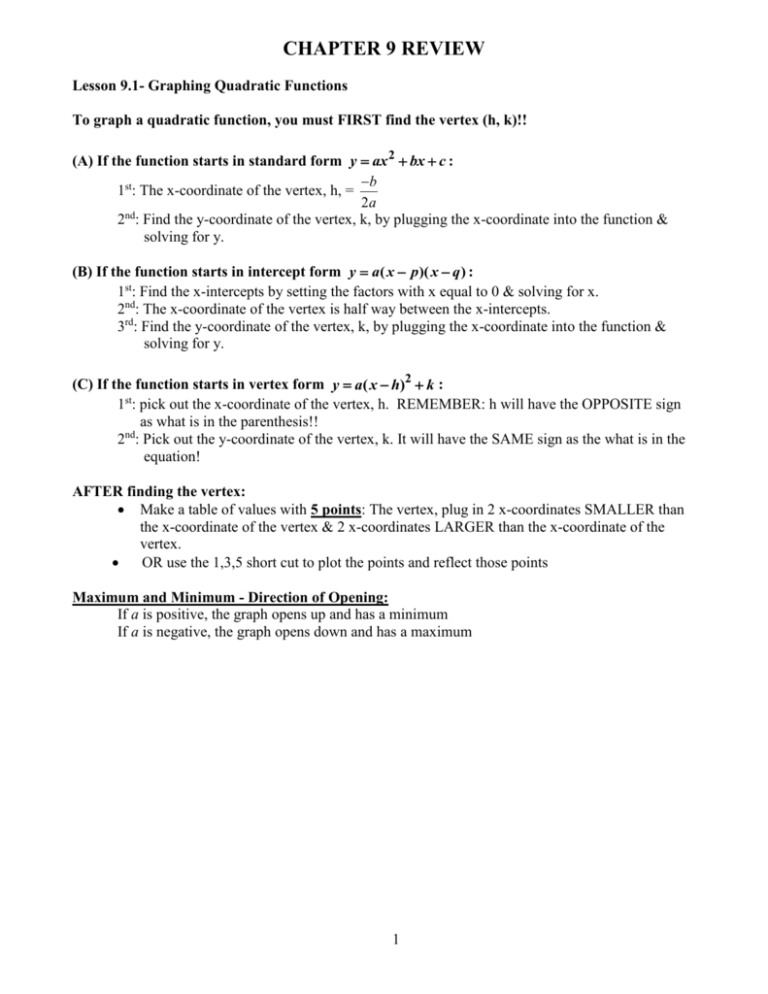
CHAPTER 9 REVIEW Lesson 9.1- Graphing Quadratic Functions To graph a quadratic function, you must FIRST find the vertex (h, k)!! (A) If the function starts in standard form y ax 2 bx c : b 1st: The x-coordinate of the vertex, h, = 2a 2nd: Find the y-coordinate of the vertex, k, by plugging the x-coordinate into the function & solving for y. (B) If the function starts in intercept form y a( x p)( x q ) : 1st: Find the x-intercepts by setting the factors with x equal to 0 & solving for x. 2nd: The x-coordinate of the vertex is half way between the x-intercepts. 3rd: Find the y-coordinate of the vertex, k, by plugging the x-coordinate into the function & solving for y. (C) If the function starts in vertex form y a( x h)2 k : 1st: pick out the x-coordinate of the vertex, h. REMEMBER: h will have the OPPOSITE sign as what is in the parenthesis!! 2nd: Pick out the y-coordinate of the vertex, k. It will have the SAME sign as the what is in the equation! AFTER finding the vertex: Make a table of values with 5 points: The vertex, plug in 2 x-coordinates SMALLER than the x-coordinate of the vertex & 2 x-coordinates LARGER than the x-coordinate of the vertex. OR use the 1,3,5 short cut to plot the points and reflect those points Maximum and Minimum - Direction of Opening: If a is positive, the graph opens up and has a minimum If a is negative, the graph opens down and has a maximum 1 Graph each function by making a table of values with at least 5 points or use the 1,3,5 shortcut. (A)Determine whether the function has a maximum or minimum and state it. (B) State the Domain and Range of the function. (C) State the vertex. (D) Find the equation of the axis of symmetry. 1.) f ( x) 1 ( x 6) 2 5 2 y 10 Maximum or Minimum ________ 9 8 7 6 Domain: __________________ 5 4 3 2 Range: __________________ 1 x -10 -9 -8 -7 -6 -5 -4 -3 -2 -1 -1 1 2 3 4 5 6 7 8 9 10 Vertex: _________ -2 -3 -4 -5 Equation of symmetry______________________ -6 -7 -8 -9 -10 2.) k(x) = x2 + 2x + 1 y 10 9 8 7 6 5 4 Maximum or Minimum ________ 3 2 1 Domain: __________________ x -10 -9 -8 -7 -6 -5 -4 -3 -2 -1 -1 1 2 3 4 5 6 7 8 9 10 -2 -3 Range: __________________ -4 -5 -6 Vertex: _________ -7 -8 -9 -10 Equation of symmetry______________________ 3.) f(x) = x2 – x – 6 y 10 9 8 7 6 Maximum or Minimum ________ 5 4 3 Domain: __________________ 2 1 x -10 -9 -8 -7 -6 -5 -4 -3 -2 -1 -1 1 2 3 4 5 6 7 8 9 10 Range: __________________ -2 -3 -4 Vertex: _________ -5 -6 -7 -8 -9 Equation of symmetry______________________ -10 2 4.) f ( x) x2 2 x 3 y 10 9 8 7 Maximum or Minimum ________ 6 5 4 3 Domain: __________________ 2 1 x -10 -9 -8 -7 -6 -5 -4 -3 -2 -1 -1 1 2 3 4 5 6 7 8 9 10 Range: __________________ -2 -3 -4 Vertex: _________ -5 -6 -7 -8 Equation of symmetry______________________ -9 -10 5.) h( x) 2 x 2 4 x 1 y 10 9 8 7 Maximum or Minimum ________ 6 5 4 3 Domain: __________________ 2 1 x -10 -9 -8 -7 -6 -5 -4 -3 -2 -1 -1 1 2 3 4 5 6 7 8 9 10 Range: __________________ -2 -3 -4 Vertex: _________ -5 -6 -7 -8 Equation of symmetry______________________ -9 -10 1 6.) g ( x) ( x 4)( x 6) 3 y 10 9 8 Maximum or Minimum ________ 7 6 5 4 Domain: __________________ 3 2 1 Range: __________________ x -10 -9 -8 -7 -6 -5 -4 -3 -2 -1 -1 1 2 3 4 5 6 7 8 9 10 -2 -3 Vertex: _________ -4 -5 -6 -7 -8 Equation of symmetry______________________ -9 -10 3 Understand how a function shifts and moves in relation to the parent function f(x) = 𝒙𝟐 Lesson 9.3 – Transformations of Quadratic Function *Be able to describe the transformation given the function A translation (left or right) occurs when you add or subtract a constant to the parent function o g(x) = 𝑥 2 − 4 A translation (up or down) occurs when you add or subtract a constant from x in the parent function o g(x) = (𝑥 + 2)2 A dilation occurs when |𝑎| > 1 or |𝑎| < 1 o The graph is stretched when |𝑎| > 1 g(x) = 3𝑥 2 o The graph is compressed when |𝑎| > 1 g(x) = −2𝑥 2 A reflection over the x-axis occurs when the value of a is negative o g(x) = −𝑥 2 Methods for Solving Quadratic Equations: A.) Unit 5 (chapter 8) – Factoring 1st: Set equal to 0 2nd: Factor out the GCF 3rd: Complete the X & box method to find the factors or use the Boston Method 4th: Set every factor that contains an x in it, equal to 0 & solve for x. B.) Lesson 9.2 –Solving Quadratic Equations by Graphing −𝑏 1st: Find the vertex using 𝑥 = 2𝑎 2nd: Graph the vertex and several other points on either side of the axis of symmetry 3rd: Determine the x-intercepts, these are your solutions (Remember you can have no solution, one solution or 2 solutions. C.) Lesson 9.4 - Completing the Square 1st: Move the constant (number with no variable) to the right so that all variables are on the left & all constants are on the right. 2 2nd - Create a perfect square trinomial on the left side by adding b to both sides. 2 4th: Factor the left side into a square of a sum or difference. 5th: Take the square root of both sides of the equation. REMINDER: Don’t forget the 6th: Solve for x D.) Lesson 9.5 - Quadratic Formula 1st: Set the equation equal to 0. 2nd: Find the values of a, b, and c & plug them into the Quadratic Formula: x b b2 4ac 2a 3rd: Simplify the radical as much as possible. 4th: If possible, simplify the numerator into integers. 5th: Divide. REMINDER: If you have 2 terms in the numerator (ex: 4 6 3 ), divide BOTH 2 terms by the number in the denominator (the example would result in 2 3 3 ) 4 Examples: Solve each equation by the method stated. By Factoring: 7.) x2 – 4x – 5 = 0 8.) 3x2 8x 5 0 9.) 2 x 2 x 15 10.) x2 12 x 32 0 11.) 3 x 2 2 x 21 12.) 2x2 4x 30 0 By Graphing: 13.) y x 2 16 x 2 14.) y 2 x 2 4 x 7 1 15.) y ( x 4) 2 8 3 y y y 10 10 10 9 9 9 8 8 8 7 7 7 6 6 6 5 5 5 4 4 4 3 3 3 2 2 2 1 1 1 x -10 -9 -8 -7 -6 -5 -4 -3 -2 -1 -1 1 2 3 4 5 6 7 8 9 10 x -10 -9 -8 -7 -6 -5 -4 -3 -2 -1 -1 1 2 3 4 5 6 7 8 9 10 x -10 -9 -8 -7 -6 -5 -4 -3 -2 -1 -1 -2 -2 -2 -3 -3 -3 -4 -4 -4 -5 -5 -5 -6 -6 -6 -7 -7 -7 -8 -8 -8 -9 -9 -9 -10 -10 -10 5 1 2 3 4 5 6 7 8 9 10 By Completing the Square: 16.) x2 – 6x – 11 = 0 17.) 2y2 + 6y – 18 = 0 18.) 2x2 – 3x – 1 = 0 19.) x2 16x 15 0 20.) 5x2 10 x 20 0 1 21.) x 2 4 x 6 0 2 By Quadratic Formula: 22.) x2 + x = 12 23.) 5x2 – 8x = -3 24.) 2x2 = 4 – 7x 25.) x2 3x 5 0 26.) 3x2 2 x x2 5x 1 6
